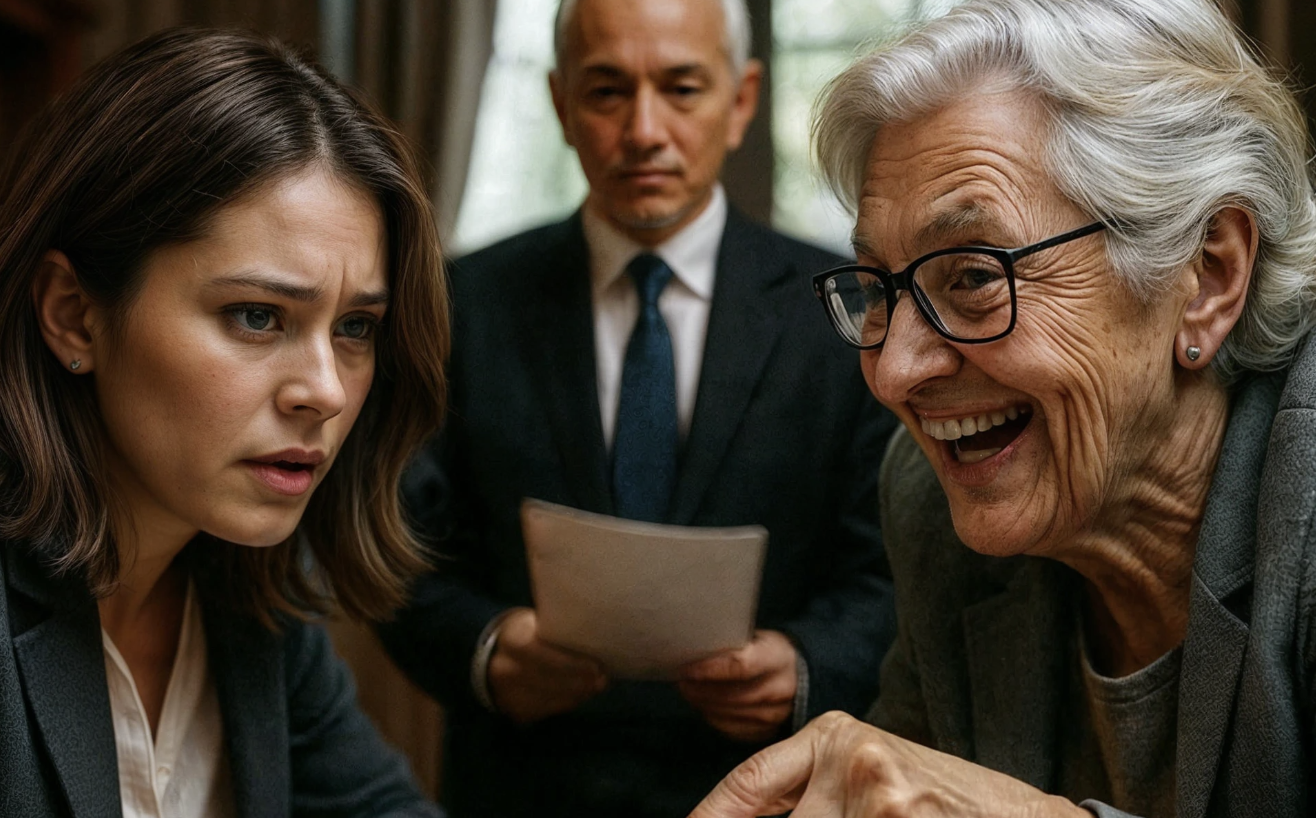“Sign here and the apartment will be transferred to Antonina Pavlovna,” the notary said, pushing the papers toward her. But Marina’s hand froze in mid-air when she saw the triumphant smile on her mother-in-law’s face.
The notary’s office was stuffy despite the air conditioner humming in the corner. Marina Sergeyevna sat at a massive oak desk, her fingers white from gripping the pen too hard. Opposite her, like a vulture waiting for its prey, sat her mother-in-law — Antonina Pavlovna Krylova, a seventy-year-old woman with an iron grip and an icy gaze.
“Why are you hesitating, dear?” her mother-in-law cooed in a sickly sweet voice that always sent shivers down Marina’s spine. “We’ve discussed everything. Grandma Liza’s apartment goes to me, as it should. I’m the eldest in the family.”
Marina lifted her eyes to her husband. Pavel was standing by the window, turned away, pretending to study the view of the city square. His shoulders were tense, his hands shoved deep into his trouser pockets. He knew. Of course he had known all along.
Grandma Liza, Marina’s only truly close relative, had died a month ago. Ninety-two years old, she had slipped away quietly in her sleep. That two-room apartment in the city center was all she had left behind. And she had left it to her beloved granddaughter, Marina. The papers had been done properly; the will had been made at the notary’s office five years earlier. But Antonina Pavlovna had decided otherwise.
“Pavlusha explained the situation to you?” the mother-in-law went on, steel creeping into her voice. “It’s not good when there’s such inequality in a family. You have a job, a salary. I’m a pensioner — I need this apartment more. To rent out, you understand? Extra income.”
Marina remembered how, two weeks earlier, Antonina Pavlovna had shown up at their place. Not just come to visit — moved in with suitcases.
“I’ll stay here for a while,” she had announced, dropping heavily onto the couch. “I’m starting a renovation. I’ll be here a week or two.”
Pavel hadn’t even asked his wife’s opinion. He just nodded and dragged his mother’s suitcases into the guest room. And then the nightmare began.
Antonina Pavlovna got up at six in the morning and banged dishes in the kitchen. She rearranged things as she pleased. Criticized every dish Marina cooked. Poked her nose into everything — from what shampoo Marina used to when they were planning to have children.
“You and Pavlusha aren’t in a hurry with the kids,” she would sigh at dinner. “I’m already seventy and still no grandchildren. Maybe there’s a problem? You should see a doctor.”
Marina would blush and stay silent. Pavel looked away and tried to steer the conversation elsewhere. They had been trying for a child for three years, had undergone a ton of tests. There were no medical problems on either side — it just wasn’t happening. And every such remark from her mother-in-law hit a raw nerve.
But the real horror began after Grandma Liza’s death. It was as if Antonina could smell money. The very next day after the funeral she launched into a full interrogation.
“So what’s with the apartment? Who did she leave it to? Where are the papers?” she pelted Marina with questions while the younger woman still hadn’t recovered from losing the person closest to her.
When she found out the apartment had been willed to Marina, her face darkened. And the very next day she began her “campaign.”
“Think about it yourself, dear,” she cooed, spooning another helping of her “signature” salad — which Marina secretly despised — onto her plate. “What do you need two apartments for? You already have this three-room one. And I’m crammed into a tiny one-bedroom on the edge of town. It’s unjust.”
Marina tried to explain that the apartment was her grandmother’s memory, that she’d grown up there, that every corner was dear to her. But Antonina only waved her off.
“Sentimentality! Nowadays you have to think practically. An apartment in the center — that’s a gold mine! You can rent it for good money. Or sell it and invest in something profitable.”
Pavel kept silent. Marina hoped he would support her, but her husband treacherously stayed out of it, glued to his phone or the TV. And then, a week ago, that conversation happened.
Marina came home from work earlier than usual — they’d let her go after a staff meeting. The key turned in the lock silently. The hallway was quiet, but voices carried from the kitchen. Marina froze, recognizing her husband’s voice.
“Mom, I can’t just force her,” Pavel was saying tiredly. “It’s her inheritance, her grandmother…”
“Pavlusha, my son,” his mother cut him off in that special tone she used for manipulation, “you understand I’m not doing this for myself. For you two! Just imagine the income from that apartment. Fifty thousand a month at least! It will help with your future children.”
“But Marina…”
“What about Marina?” steel flashed in her voice. “She’s your wife, isn’t she? She should listen to her husband! And you should know how to insist on your own way. Or are you not a man? A spineless rag?”
Marina pressed herself against the wall, her heart pounding wildly. She waited for Pavel to protest, to defend her. But all she heard was a heavy sigh.
“All right, Mom. I’ll talk to her.”
“That’s my good boy. And I’ll go to the notary in the meantime, find out everything. I know someone there; she’ll help us draw up the documents properly.”
Marina slipped out of the apartment on tiptoe and sat on a bench outside for half an hour, trying to calm down. When she came back, she made sure to slam the door loudly. Pavel met her in the hallway with a guilty smile.
“Hi, honey. How was your day?”
She looked him straight in the eyes, searching for any hint of the conspiracy she had just overheard. But Pavel looked as usual — a little tired, a little distant.
“Fine,” she replied, walking past him.
At dinner, Antonina was especially sweet. She praised Marina’s work, asked about their vacation plans, even suggested they all go together to a friend’s dacha. Marina answered in monosyllables, unable to force herself to play along.
And then the real pressure began. Every day her mother-in-law came up with new arguments. She told heartbreaking stories about poor pensioners who couldn’t afford medication. She sighed that she dreamed of helping Pavlusha buy a new car — the old one was practically falling apart. She hinted that with extra income they could finally afford expensive fertility treatment abroad.
Pavel joined the attack three days later. At first cautiously, in passing.
“Marina, maybe Mom’s right? What do we need an empty apartment for? We could rent it and save the money.”
“It’s my grandmother’s memory, Pasha. I grew up there. I can’t give it away or rent it to strangers.”
“But it’s not practical…”
“Since when did you become so practical?” Marina snapped. “Or is that something Mommy taught you?”
Pavel took offense and clammed up. But the next day he came back to the topic. And the next. And the next. His arguments grew more insistent, his tone harsher.
“You’re being selfish,” he threw at her one evening when she once again refused to discuss it. “You’re only thinking about yourself. Have you thought about me? About our future?”
“What future, Pavel? The kind where your mother decides how we live and what we do with MY inheritance?”
“Don’t you dare talk like that about my mother! She only wants what’s best for us!”
“Best?” Marina laughed, the sound coming out half-hysterical. “She wants to take the last thing I have left from my grandmother. And you’re helping her.”
The fight was huge. Of course, Antonina heard everything from the next room. The next morning she stalked around the apartment with the air of a deeply wronged saint, sighing loudly and muttering under her breath about ungrateful daughters-in-law.
And two days later something happened that finally opened Marina’s eyes. She came home and found her mother-in-law in their bedroom. Antonina was rummaging through documents laid out on the bed.
“What are you doing?” Marina couldn’t believe her eyes.
Her mother-in-law didn’t even flinch.
“Tidying up. Your paperwork is a mess. Look at all these important documents just lying around,” she waved the death certificate of Grandma Liza.
“These are my personal papers! You have no right!”
“Oh, don’t be so dramatic,” Antonina brushed her off. “We’re family. What secrets can there be? By the way, I’ve decided. Tomorrow we’re going to the notary to get everything done quickly. No point dragging this out.”
“I’m not going anywhere!”
“Oh yes, you are,” her voice turned hard. “Pavlusha will talk to you. And if you don’t listen — don’t blame me. So many things can happen to an original will. Fires, thefts… Anything can happen.”
It was a direct threat. Marina went cold. She stared into her mother-in-law’s brazen eyes and understood — this woman was capable of anything.
That evening they had the decisive conversation with Pavel. Marina told him what his mother had done, about the blackmail, the threats. Pavel listened, frowned, but in the end said what broke her completely.
“Marina, maybe it really would be easier to just give her the apartment? Mom won’t calm down otherwise. You know how persistent she is. Why do we need these constant fights?”
“So you’re suggesting I surrender? Hand over my inheritance because she’s ‘persistent’?”
“I just want peace in the family…”
“And I want a husband who will protect me, not bend over backward for his mommy!” Marina shouted.
But Pavel only shrugged and went to watch TV.
And now here they were, sitting in the notary’s office. Antonina had dragged them here early in the morning, clearly hoping to catch Marina off guard. The papers to transfer the apartment into her name were already prepared — she hadn’t lied about having a “friend” at the notary’s office.
“Well, Marina dear, we’re waiting,” her mother-in-law sang, though her eyes stayed cold.
Marina looked at her, then at Pavel, who stubbornly avoided her gaze. And suddenly everything fell into place. The whole show, this make-believe “loving family” — it was all a lie. To them, she was an outsider. Always had been, always would be.
Marina slowly set the pen down on the desk.
“No,” she said calmly.
“What do you mean, ‘no’?” Antonina jerked up in her chair.
“It means I’m not signing these papers. Not today, not tomorrow, not in a week. Never.”
“Marina,” Pavel finally turned to her, “don’t be ridiculous. We agreed…”
“No, you two agreed. Behind my back. You conspired to take my inheritance from me. But you know what? It’s not going to happen.”
Marina got to her feet. Her legs trembled slightly, but her voice was steady.
“And one more thing, Antonina Pavlovna. I’m giving you three days to pack your things. If in three days you’re still living in our apartment, I’ll file a police report for theft of documents and blackmail.”
“How dare you!” her mother-in-law screeched. “Pavlusha, are you hearing this?”
But Marina was already heading for the door.
“And you, Pavel, might want to think things over,” she threw over her shoulder. “Whose side are you on — your wife’s or Mommy’s? Because I’m done living as a threesome.”
The notary, who had been silently watching the family drama all this time, cleared his throat politely.
“If you’re not going to sign, then I’ll have to conclude the appointment…”
Marina walked out of the office and drew a deep breath of the fresh air. She felt both heavy and light at once. Heavy — because she understood her marriage was probably over. Light — because she no longer had to pretend, endure, or compromise.
Her phone rang almost immediately. Pavel. Marina rejected the call. Then another. And another. On the tenth call she turned the phone off completely.
Instead of going home, she went to her grandmother’s apartment. She took out the spare keys she always carried in her bag. The apartment greeted her with silence and the lingering scent of Grandma’s perfume.
Marina walked into the living room and sat down in her grandmother’s favorite armchair by the window. Everything was just as it had always been — photos on the walls, crocheted doilies on the tables, the old china set in the glass cabinet. Grandma Liza had been the only person who loved her simply for who she was, with no conditions or demands.
“I won’t let them take you from me, Grandma,” Marina whispered. “I promise.”
That evening she had to go back home. Marina expected a huge scene, but the apartment was unusually quiet. Antonina had locked herself in the guest room. Pavel was sitting in the kitchen with a bottle of beer.
“Why did you do that?” he asked without looking up. “Mom’s hysterical now. Her heart hurts, she’s taking her pills.”
“Let her. And let her pack.”
“Marina, she’s my mother…”
“And I’m your wife. Or am I not anymore?”
Pavel finally looked at her. His eyes were a mix of hurt and confusion.
“So you’re forcing me to choose?”
“No, Pavel. You forced yourself to choose when you decided to rob me together with your mom.”
“I wasn’t going to rob you! I just wanted…”
“Peace in the family?” she finished for him. “You know what I’ve realized? In your understanding, ‘peace in the family’ is when I silently swallow every humiliation, fulfill your mother’s every whim, and hand over to her anything she wants. But that’s not peace, Pavel. That’s slavery.”
The next two days passed in a suffocating atmosphere. Antonina ostentatiously stayed in her room, but Marina could hear her loudly talking on the phone, telling everyone about her “monster daughter-in-law.” Pavel moped around, trying to talk several times, but Marina shut it down each time.
“First your mother moves out. Then we talk.”
On the third day, when Marina came home from work, all of Antonina’s things were gone. But it was too early to celebrate. On the kitchen table lay a note from Pavel: “Went to stay with Mom. I need to think things over.”
Marina sat down and burst out laughing. Tears mixed with the laughter, but she couldn’t stop. The momma’s boy had run back to his mommy. How utterly predictable.
A week passed. Pavel neither called nor came. Marina made no attempt to contact him. She busied herself with finalizing the paperwork for her grandmother’s apartment, tidying it up, moving some of her things there.
On Saturday morning the doorbell rang. Thinking it was Pavel, she opened the door without asking. On the threshold stood an unfamiliar woman of about fifty.
“Marina Sergeyevna? I’m Valentina, Pavel’s cousin. May we talk?”
Marina let her in and made tea. Valentina turned out to be a pleasant woman with a tired face and kind eyes.
“I know the whole situation,” she began without preamble. “Antonina told me. Of course, in her version, where you’re practically a monster. But I’ve known her for many years.”
“So why did you come?”
“I want to tell you a story. Twenty years ago I was married to Pavel’s cousin, Igor. Back then, too, Antonina lived with us — ‘temporarily’, after her divorce. She promised to stay for a couple of months and ended up staying two years.”
Valentina took a sip of tea and continued:
“She turned my life into a nightmare. Constant nitpicking, fights, manipulation. And when my aunt died and left me a dacha, Antonina launched a full-scale operation. Said it was unfair that such wealth went to ‘the youngsters’. Naturally, Igor backed his mother. His precious auntie.”
“How did it end?” Marina asked.
“With a divorce. I couldn’t take it and left. I kept the dacha though — even though Antonina spent another year trying to get it away from me through the courts. Igor still lives with his darling mommy. He’s fifty now and never remarried. Antonina chases away all his women.”
Marina looked at Valentina and saw her own future twenty years ahead. If she stayed. If she gave in.
“Thank you for telling me.”
“I just want you to know — it’s not about you. You’re not the first, and, I’m afraid, not the last. Antonina can’t stand competition. For her, only she and her children exist. Everyone else is an enemy to be either subdued or destroyed.”
After Valentina left, Marina sat in silence for a long time. Then she took out her phone and sent Pavel a message: “Come pick up your things tomorrow. I’ll be home from 10 to 12.”
He arrived at exactly ten. Haggard, unshaven, but with the same stubborn expression on his face.
“Marina, let’s talk. Maybe we can still fix this…”
“Fix what, Pavel? The fact that you betrayed me? That you chose Mommy? That you were ready to hand over my inheritance just so she wouldn’t sulk?”
“I was thinking about us! About our future!”
“No. You were thinking about how to please your mother. As always. And you always will. Do you know what your cousin Valentina told me?”
Pavel flinched.
“Valya came here?”
“Yes. And she told me a very interesting story about your cousin Igor. Who also chose his mommy. And now, at fifty, he still lives alone with her. That’s your future, Pavel. Enjoy.”
Pavel said nothing, clenching and unclenching his fists. Then he blurted out:
“Have you even thought about how I feel? Being torn between you two? Mom crying, you threatening…”
“I wasn’t threatening. I was setting boundaries. Boundaries your mother kept crossing again and again — with your silent approval. And you know what? I don’t care how you feel. Because when I felt humiliated, insulted, robbed — you didn’t care.”
“Marina…”
“Take your things and go, Pavel. I’ll file for divorce next week. We’ll divide the marital property through the court. And tell your mother this — she will not get my grandmother’s apartment. Even if I have to hire security.”
Pavel left an hour later, carrying boxes of his belongings. At the door he turned back.
“You’ll regret this.”
“Maybe. But it’s better to regret what you’ve done than what you were too scared to do.”
The door closed. Marina exhaled and felt a strange lightness. Yes, she was heading for a divorce. Yes, she would have to start over. But it would be her life. Without a toxic mother-in-law, without a spineless husband, without humiliation and manipulation.
She walked over to the window. The sun was shining, children were playing in the courtyard. Life went on. And for the first time in a long while, Marina felt that everything would be all right. Not instantly, not easily — but it would.
Her phone rang. An unknown number. Marina answered.
“Marina Sergeyevna?” a man’s voice asked. “This is Andrey Valentinovich, the notary. Do you remember, you were here last week? I’m calling to warn you. Your mother-in-law came to see me today with some forged papers. She tried to challenge your grandmother’s will. I, of course, refused to do anything and informed her that I’d report this attempted fraud to the police. But please be careful. It looks like she won’t stop.”
Marina thanked the notary and hung up. So the war wasn’t over yet. Well then, she was ready. Grandma Liza had always said, “Sweetheart, in life you have to be able to stand up for yourself. There are no kind aunties who’ll do it for you.”
And Marina would stand up. For herself, for her memories, for her right to live the way she wanted. As for Antonina Pavlovna — let her look for another victim. This one was too tough for her to chew



